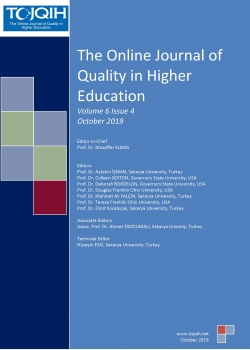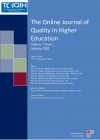TOJQIH - Volume 6 - Issue 4 - October 2019
 FIRST YEAR EXPERIENCE IN HIGHER EDUCATION: IT’S GROUNDS, AIMS AND CONTRIBUTIONS
FIRST YEAR EXPERIENCE IN HIGHER EDUCATION: IT’S GROUNDS, AIMS AND CONTRIBUTIONS Bünyamin Özen, Emrullah Yılmaz
Abstract:
The aim of this study is to introduce the concept of first year experience, which is used to facilitate university students’ adaptation to their schools. The study is a review study. As a requirement of this study, the studies carried out in national and international level are reviewed, some evaluations and recommendations are made. The basic function of education is to bring up good people and adaptation to the society contributes a lot to realize this function. University students’ adaptation to their schools contributes them a lot in terms of a number of dimensions. First year experience or first year seminar is one of the most effective implementations that can be used to realize this aim. Universities in Turkey should assign importance to the adaptation of students to their universities and they should solve the problem of adaptation by using first year seminar.
 FROM ESG 2005 TO ESG 2015: THE TIGHTENING OF A COGNITIVE FRAMEWORK
FROM ESG 2005 TO ESG 2015: THE TIGHTENING OF A COGNITIVE FRAMEWORK Miguel Souto Lopez, François Fecteau
Abstract:
A number of critical analyses have addressed the effects of quality assessment focussing, in particular, on the managerialization of higher education (Harris, 2011) through the introduction of New Public Management principles (Moorley, 2003), which are transforming the governance of universities (Kosmützky, 2016), and the power relationships between higher education institutions (Worthington & Hodgson, 2005). Other analyses have emphasised the market and competitive neo-liberal principles inherent in quality assurance in a globalised world (George, 2006; Jarvis, 2014), in which a university is expected to contribute to the growth of a knowledge-based economy (Olssen & Peters, 2007).
 ORGANISATIONAL FACTORS AFFECTING RESPONSIVENESS TO THE IMPLEMENTATION OF QUALITY ASSURANCE IN HIGHER EDUCATION: A CASE STUDY IN LEBANON
ORGANISATIONAL FACTORS AFFECTING RESPONSIVENESS TO THE IMPLEMENTATION OF QUALITY ASSURANCE IN HIGHER EDUCATION: A CASE STUDY IN LEBANON Manale Khalil
Abstract:
Since the 1980s, quality assurance in higher education has developed world-wide. Nevertheless, differential implementation in pace and scope has also been demonstrated. Using a quantitative research approach, this research provides evidence on the organisational factors contributing to the variance in implementation by taking the Lebanese business schools as a case study.
The research concludes that responsiveness is associated with a number of factors; the size and vertical differentiation of the business school have been found to impact responsiveness to quality implementation with large business schools offering a doctoral degree being more likely to implement quality assurance measures.
 UNDERSTANDING QUALITY IN PHILIPPINE PRIVATE NON-SECTARIAN HIGHER EDUCATION
UNDERSTANDING QUALITY IN PHILIPPINE PRIVATE NON-SECTARIAN HIGHER EDUCATION Jose Maria Morales
Abstract:
An inverse relationship exists between the growing number of Private Non-Sectarian Higher Education Institutions (PNSHEI) and diminishing student performance in terms of graduate employment and passing rates in the national board examinations. The purpose of this multiple case study was to describe how three Philippine PNSHEIs that operate as both education providers and business ventures understand Quality. A multiple case study methodology and two level sampling were conducted. Three PNSHEIs that represent the vertical typology of Autonomous, Deregulated, and Regulated private colleges or universities in the Philippines were selected and within each site, an administrator, a faculty member, a student, and a parent of an enrolled student were interviewed. Documents, observations and extant literature were used for data triangulation. A within- case, and cross-case analysis were performed. Findings of the study suggest that leadership and governance were essential to drive all other institutional efforts to promote quality higher education and within each institution Quality was predicated on accreditation but understood by the individual participants as stakeholder satisfaction. Results suggest that mandatory accreditation and demographic specific strategies to promote stakeholder satisfaction are essential for Quality in Philippine PNSHEIs.






